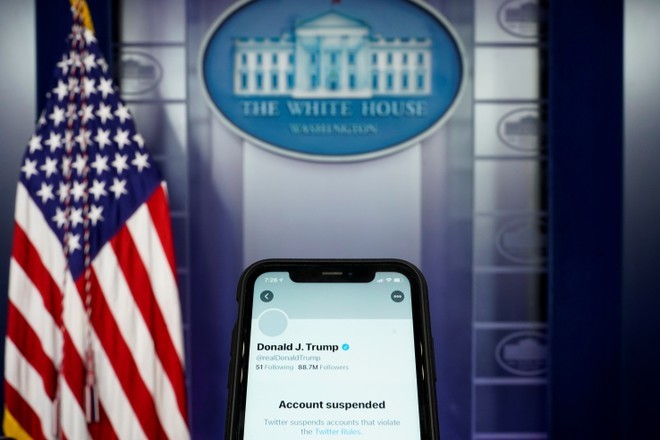The German Chancellor is far from being the only person who has raised the alarm on the US President’s suspension from the social media platform. Other prominent political figures, ranging from Mexico’s president Andres Manuel Lopez Obrador to France’s economy minister, Bruno Le Maire, have expressed their concerns regarding the ban. I firmly stand with their concerns, and if you use social media, then you should too.
 |
|
President Trump's account, with more than 88 million followers, has been locked by Twitter. Photo: Reuters
|
Take Germany for example. Despite hailing free speech as one of its bastions of freedom, Germany has remained relatively strict on which type of content is allowed to exist on social media platforms used by its citizens, owing to its history. If German public authorities detect provocative behavior on social media, such as hate speech or references to Nazism, social media companies are required to remove such content from their platforms, and face a fine of over $60 million for failing to comply. However, Seibert said in the same press conference that the general behavior of social media companies, including their ability to restrict and censor content on their platforms, is “under the legal framework decided by legislators, not by those who run the company".
Whether or not one agrees about President Trump’s conduct on social media, the fact that Twitter, Facebook and other platforms were able to decide on their own to strip away the US President’s main channel of communication by either restricting (Facebook, YouTube, Instagram) or outright banning his presence (Twitter) is something that not only Americans but also most governments and everyone around the world who uses social media should worry about.
Despite having been in our social lives for less than two decades (Facebook in 2004, Twitter in 2006), social media platforms have rapidly transformed into a global phenomenon where they now serve as the primary medium of communication for billions of people. Once relatively harmless “public squares” where users can easily interact with one another, social media networks have grown into formidable platforms, giving their creators unprecedented supranational power – not just by gathering personal information and collecting trends and being able to sell this information for billions of dollars, but also by dominating, if not directly influencing, social trends through the power of advertisements and information selection. In many cases, this has become a significant matter in national politics for many countries.
When Twitter first labelled Trump’s false claims about election fraud with a warning for the first time on May 26, ,2020, this was not the first time that Twitter executives publicly expressed their views through political interference. The social media platform, as well as Facebook, has been used by various political groups to rally the public and spread its messages, from the Austrian student protests and the Gaza disputes in 2009 to G20 protests in Toronto and the Arab Spring in 2011. Here, however, the attitude displayed by Twitter with these examples is nowhere similar to what transpired with Trump recently, which resembled more of the 2019-2020 protests in Hong Kong – where the platform swiftly removed over 1,000 accounts perceived as being associated with Mainland China – or in June 2020 in Turkey – where over 7,000 accounts believed to be managed by Turkish authorities as a way to facilitate support for President Recep Erdogan were taken down. I will not argue whether these examples are right or wrong, but they do provide a sound comparison.
But perhaps, what happened in America may be the clearest example of how regulators on social media platforms can significantly interfere in politics. Facebook and Twitter executives are known to be pro-Democrat, which was shown after the New York Post published a report on Hunter Biden last October. The same executives at Facebook and Twitter ordered their platforms to suppress information on the report. Facebook deliberately slowed down the spread of information on its platform, while Twitter blocked users from being able to share the report, citing “this article contains stolen information”. Several weeks later, users could again share the New York Post article with no restrictions after Twitter and Facebook executives were ordered to appear at a hearing in the US Senate, which was requested by a number of Republicans. It may have been too late, however, as tens of millions of Americans had already cast their ballots, and the “October surprise” of the Republicans failed to reach many voters. Many conservative politicians and pundits have accused such social media regulators as “interfering in the election", but it’s likely we will never know who is right here.
The climax of the engagement was probably when all mainstream social media networks “joined forces” to shut down Trump’s accounts after the Capitol riots, which first alarmed the Mexican president before becoming a matter of concern for the German chancellor, who definitely won’t be the last person to view the behavior of social media executives and Big Tech as problematic. Many may perceive that we cannot continue allowing social media networks to act as self-proclaimed courts for deciding what information is allowed on their platforms, but that there needs to be firm regulations that place these companies within the legal frameworks of where they operate.
If you have ever been interested in or have read the agreements set out by social media platforms such as Facebook and Twitter to which you had to agree in order to use their services, you may have noticed a big problem – the rules are not based on, or bound by, the laws of any particular country. Any agreement, especially those that may have legal status such as here, needs to be assessed within the specific framework of the legal system governing those agreements. In the case of these terms of services made by social media networks, there is no such system. No such provisions are offered to the users. This means that all behavior, rights and obligations of users on social media will be reviewed and adjudicated by those who run these platforms. It is difficult to imagine the existence of such a social contract, but they exist for every one of the billions of people who use these platforms. Civil society is similar in a civilized society, where one party is both a signatory and a judge of right and wrong in an engagement.
And, of course, therefore, it is almost impossible for users to take any sort of meaningful legal action towards these companies, especially for users outside the United States, where all user complaints are addressed either through automated computer systems or by those in Silicon Valley. Most public authorities in countries where these networks are used also hardly have any viable tool to hold these companies liable if the interests of their citizens are violated -- for example, when their accounts are hacked into or stolen.
On the other hand, many still think that social media networks do possess the rights to filter information, as they provide their services to users for free. This possibly comes from the fact that, to attract users, social networks hardly force users to submit any monetary fees. However, they collect your personal information, your habits, even your friends, and use that information to make a profit. And so, perhaps, to say that these companies provide an entirely free service to users is rather incorrect. Even in that case, they should always have certain obligations to users, governed by the laws of each country.
It is also not advisable to continue associating the idea of “statelessness” to Big Tech and social network platforms, for it is these same companies that apply their idea of “state-boundedness” very well when faced with tax issues in the United States, where they use the nationality of their subsidiaries in Ireland, the Netherlands or Singapore to fix their issues. Social network companies only reject the idea of being bound to particular states if it otherwise forces them to be obliged to users, to citizens of particular countries.
With Silicon Valley social media executives being directly involved in American politics with their personal political views, they have the power to interfere, and have successfully interfered, with elections and the flow of information as we have seen this past year in the United States, as well as in many other countries. It may be time to put forward the question on the necessity to build comprehensive legal frameworks that will prevent these social media companies from acting outside, standing above the law.
Pham Quang Vinh

Code of conduct on social media to come soon
The Ministry of Information and Communications (MIC) has compiled a Code of Conduct (COC) for social networks,
